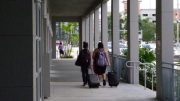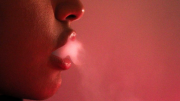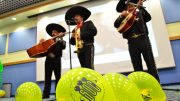By: Nicole Castro/Staff Writer
Although Florida has seen a sixty percent increase in same sex households since the 2000 census, the most recent Lesbian Gay Bisexual Transgender-Friendly Campus Climate Index demonstrates that the University, which serves a dynamic group of over 44,0000 students, is not as gay-friendly as was expected in a state where homosexuality is prevalent.
Operated by Campus Pride, a national nonprofit organization that works to create safer, more LGBT-Friendly learning environments at colleges and universities, the LGBT-Friendly Campus Climate Index is a tool that most universities use to measure their progress in providing for the needs of their LGBT students.
Based on a five star rating system, which rates campus gay-friendliness depending on answers provided by students, faculty and staff, the University was given an overall campus climate score of two and a half stars.
“We are aware that the score was at the lower end, but we are looking to improve the score in the future,” said Camille Perkins, the LGBT Initiative graduate assistant for the Multicultural Programs and Services department at Biscayne Bay Campus.
The campus climate score was comprised of the following subcategories: LGBT policy inclusion, support & institutional commitment, academic life, student life, housing, campus safety, and counseling and health.
Of the aforementioned areas, counseling and health was awarded five stars, while the lowest score was one and a half stars given to recruitment and retention efforts along with campus safety.
Rossmery Galan, a junior education major who identifies with the lesbian community, said that “we can’t claim to be ‘Worlds Ahead’ if we continue to allow LGBT people to fight the same fight they’ve been struggling to overcome for centuries.”
In regard to the low rating for Public Safety, Giovanni Correale, president of Stonewall Pride Alliance, a University organization that promotes awareness on LGBT issues, explained that “the Department of Public Safety is not necessarily trained on sexual orientation issues.”
“If you have a transgender individual who doesn’t necessarily look like the sex they identify with and they’re using a different bathroom for what they seem to be, the officer may see it as public disturbance because they are not trained in LGBT issues” he says
The Department of Public Safety was unavailable to comment. However, Correale has plans to communicate with the director to address the problem. He emphasized the difficulty of addressing safety issues when the people in charge of keeping students safe are not educated in that sense.
The Department of Public Safety was unavailable to comment. However, Correale has plans to communicate with the director to address the problem. He emphasized the difficulty of addressing safety issues when the people in charge of keeping students safe are not educated in that sense.
Under recruitment and retention efforts, the questionnaire inquired whether there was an effort to recruit LGBT students like the rest of minorities and provide scholarship opportunities.
Correale and Jameer Baptiste, vice president of SPA, plans to propose that funds from the University are used for students under LGBT in order for them to benefit directly.
With the construction of new buildings, such as PG5 and the School of International and Public Affairs at the Modesto Maidique Campus, the implementation of family bathrooms gives the transgender community the option of being more comfortable.
Baptiste, however, expressed that it would be better to make those adjustments for the older buildings that are identified for “men” or “women”, which will create a sense of inclusion for everyone.
“It’s really disconcerting and disheartening to be an identifier with the LGBT community and to know that our campus isn’t really safe for people like me. But now, the proper reaction should be, what can we do about it. We should engage not only the departments that didn’t score high, but the community as a whole so we can create awareness and acceptance,” said Baptiste.
During her freshmen year in college, Helena Matamoros, a current sophomore majoring in mathematics, experienced what it meant to be part of a minority group. As part of her public speaking class, she decided to give an oral presentation on LGBTs in society.
As a way of introducing herself, she said, ‘Hi, my name is Helena Matamoros, and I’m a lesbian’. As she pronounced that last bit of information, she saw a few of her peers faces change while her professor kept on watching her “as if [she] had said [her] age and nothing much more significant.”
“She treated me the same and made me feel welcomed even though some of my classmates had begun classifying me the moment I uttered those simple words,” she recalled.
“What i have heard a lot throughout the student body is the use of unnecessary terminology to signify other things. The main ones being ‘That is so gay’ or ‘You’re so gay’. Then there’s the regular ‘You’re a f–‘ and ‘You’re such a [expletive] homo’,” she says.
Matamoros believes that the awkward looks from students and the terminology used by their heterosexual counterparts are several of the hardships students like her must confront on a daily basis.





Be the first to comment on "LGBT-Friendly Campus Climate Index shows low-ratings at University"